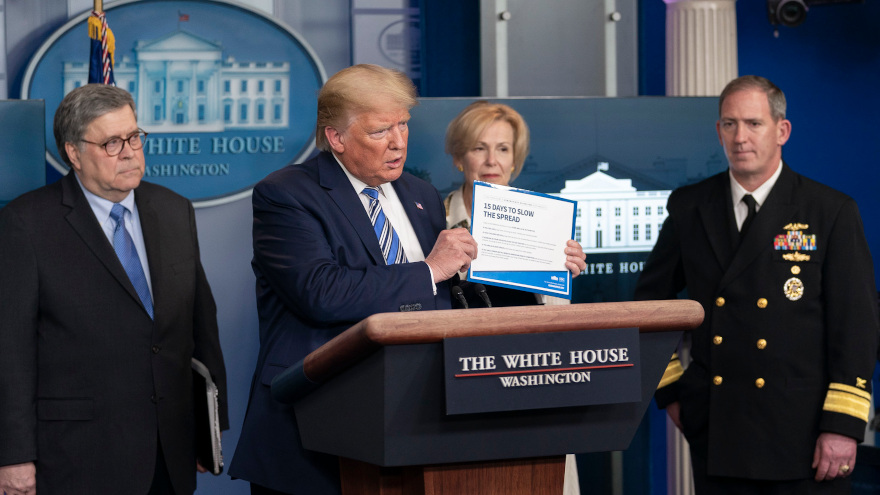5 groups ask Trump to keep vehicle-sales operations open

President Trump holds a copy of the coronavirus guidelines brochure at a coronavirus (COVID-19) update briefing on Monday at the White House. White House photo by Shealah Craighead.
By subscribing, you agree to receive communications from Auto Remarketing and our partners in accordance with our Privacy Policy. We may share your information with select partners and sponsors who may contact you about their products and services. You may unsubscribe at any time.
TYSONS, Va. –
As additional states and municipalities issue stay-at-home orders and business closures, dealerships are caught in a coronavirus-created storm of confusion.
On Tuesday, the leaders of the National Automobile Dealers Association (NADA), the American Truck Dealers (ATD), the National Association of Minority Automobile Dealers (NAMAD), the American International Automobile Dealers Association (AIADA) and the Alliance for Automotive Innovation sent a letter to President Trump asking for clarification that vehicle sales are essential services that need to be maintained during the COVID-19 pandemic.
Federal officials already issued clarity that vehicle repair shops are deemed to be essential services and are to remain open.
The associations explained the ability to provide replacement cars and trucks in response to any number of scenarios will be vital to ensuring that those in need of reliable personal transportation continue to have access to it. The groups stressed that franchised car and truck dealers recognize the need to conduct even limited sales and leasing activities in a manner that protects the general public, our customers and our employees.
“Most consumers are concerned about their jobs, families and health and will not be in the market for new or used vehicles for weeks or months, so the overall effect of this additional capacity will be limited,” the groups wrote. “However, for the many people who may need a replacement vehicle or a new vehicle for any number of reasons, the additional sales activity surely would be defined as vital or essential to them.”
“Additionally, many of nation’s essential workers, including first responders, medical workers, grocery store employees, delivery drivers, and other providing similar services may suddenly find that they need a more reliable way to get to these critical jobs,” the letter continued. “In short, there are thousands of scenarios that would prompt the urgent need for a car, SUV or truck – now more than ever.”
Subscribe to Auto Remarketing to stay informed and stay ahead.
By subscribing, you agree to receive communications from Auto Remarketing and our partners in accordance with our Privacy Policy. We may share your information with select partners and sponsors who may contact you about their products and services. You may unsubscribe at any time.
According to the letter:
• In 2019, 12.55 million vehicles were scrapped because they wore out or it was not economical for them to be repaired. Approximately 9.4 million of those vehicles were replaced with a new or used vehicle.
• In 2018, 1.24 million vehicles were determined by insurance companies to be total losses as a result of an accident, flooding or other total loss events. Individual consumers and businesses typically use their insurance proceeds to purchase a substitute vehicle within a few days. Without that option, they may not have affordable, reliable transportation to meet their personal or commercial needs.
• Between March and July of this year, 1.8 million vehicle leases will expire (4.1 million for the entire year of 2020), all of which will require replacement. In many ways, these customers will face the same challenges as described above following a total loss.
• Virtually all of last year’s 500,000 sales of medium and heavy-trucks were sold for use in commercial fleets. Officials noted 71.4% of our nation’s tonnage freight is hauled in trucks sold by our truck dealer members.
• The associations estimated that around 500,000 “Essential Critical Infrastructure Workers,” as defined in DHS/CISA Guidance (healthcare providers, law enforcement, public safety, first responders, food and agriculture employees, etc.), annually acquire a new or used vehicle.
“Not all vehicle sales are discretionary consumer purchases. A significant number of dealership sales transactions occur because a consumer or business is in immediate need of a replacement vehicle for basic transportation. This clarification is particularly important as various transit services have been curtailed or eliminated due to the public health recommendations about social distancing,” the groups said. “Our members would simply like to provide vehicles to those customers in a secure manner, while at the same time meeting our obligation to the public-at-large and our employees.”
The entire letter can be viewed here.


